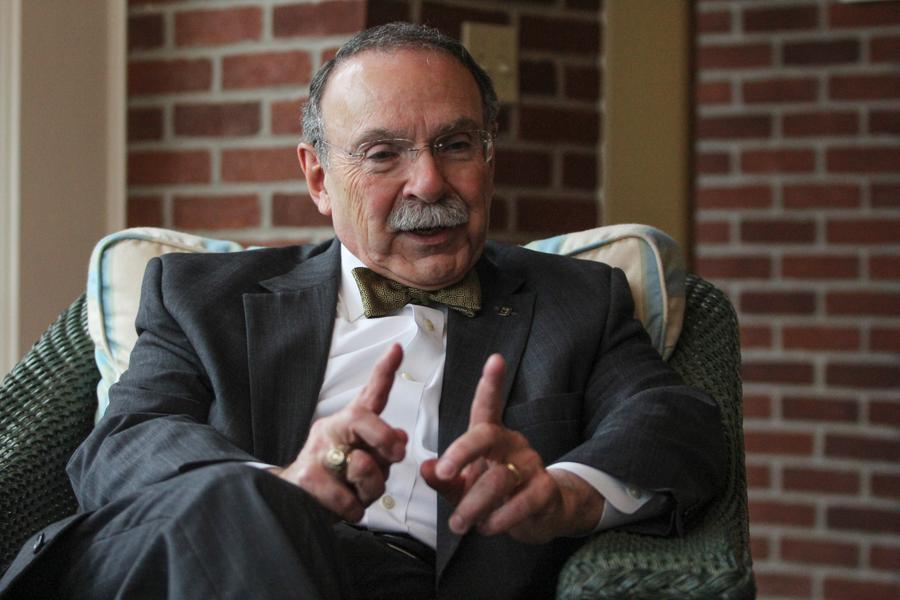
R. Bowen Loftin is still working at MU, but five months after resigning as chancellor, he doesn’t yet have a defined job title.
“It’s close to being finalized, and then I’ll have a business card, finally,” Loftin said.
Loftin and interim Chancellor Hank Foley have worked together to create a completely new role focusing on connecting MU faculty’s research goals with national security organizations to increase research opportunities and funding.
“We have great faculty here who have a lot of expertise, but we aren’t going after these particular sources of funding right now the way we could go after them,” Loftin said. “If I can find ways to make that more available and more easily done, that would be helpful.”
His work to obtain research funding could improve MU’s standing in the Association of American Universities, which has [taken a backseat](https://www.themaneater.com/stories/2016/4/11/improving-aau-status-long-term-game-following-budg/) to other issues in the face of budget cuts and administrative transitions.
Loftin said he is still earning his full chancellor’s salary of $459,000 per year until May 1, when he will begin earning $344,250 per year. He said he doesn’t know if his role will be affected by the university’s budget shortage.
“The system decided to keep paying me through the end of April as part of the transition,” Loftin said. “The idea was that I would assist in the transition to a new leader here on the campus, and that was the way they put it together.”
Loftin stepped down Nov. 9 following [a semester of tension](https://www.themaneater.com/stories/2015/11/24/administrative-faculty-and-student-discontent-led-/) with some administrators, faculty and students. According to his transition agreement signed the day he resigned, he planned to take two administrative roles: director for research facility development and director of university research in support of the Tiger Institute for Health Innovation.
Five months later, neither of these positions are solidified, Loftin said in an interview with The Maneater. The development of new facilities has been slowed considerably because of [campuswide budget shortages](https://www.themaneater.com/stories/2016/3/9/mu-experience-32-million-budget-loss-enrollment-de/).
The position with the Tiger Institute, which is a partnership between MU and health care IT company Cerner, is “still a possibility,” Loftin said, but it’s uncertain right now. Cerner spokesman Dan Smith [told the Columbia Daily Tribune](http://www.columbiatribune.com/news/education/turmoil_at_mu/loftin-receiving-full-pay-from-university-of-missouri-as-future/article_8c53dd50-ee76-5633-ad1f-ee22ed05c61a.html) that a job for Loftin had not been submitted to the institute’s Board of Governors.
So far, Loftin said he’s been reaching out to people he has worked with who are involved in government organizations to find opportunities for faculty to expand their research. He’s also spent time meeting with faculty members to discuss their research and goals for the future.
“The faculty here are really very good people,” he said. “They know a lot and they can do a lot. They need to be encouraged to think bigger. We need to realize that we are really a good place and that we haven’t been good enough about telling other people how capable we are of doing some extraordinary research and extraordinary teaching.”
He said he’s also been able to gain a greater understanding of what faculty are doing on an individual level.
“I studied the university a lot as chancellor, but not at the level I’m doing right now,” he said. “I need to really understand who our faculty are in terms of our research capabilities and their research aspirations. To me, that takes a lot of time and energy, but I don’t mind doing it.”
Even in a less public position, Loftin has still been involved on campus, meeting personally with students who reach out to him and attending sporting events as “purely a spectator.”
“People seem to think I’m doing nothing, which is totally false,” he said. “I’ve been very busy since all this happened back in November. It’s really on relationships and on learning more about the university at the right level.”
_Edited by George Roberson | [email protected]_